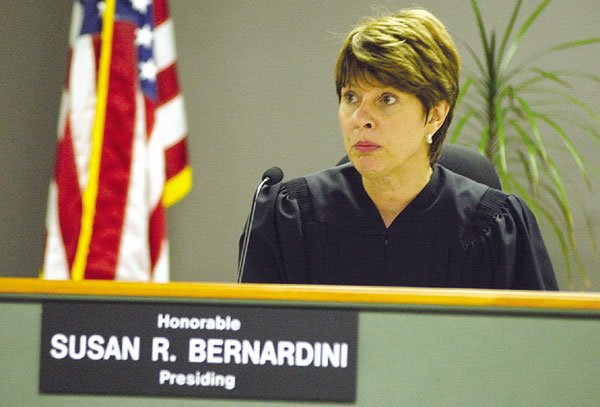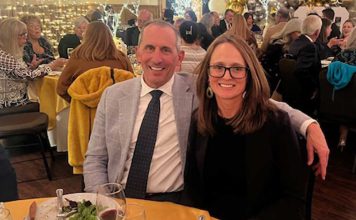Santa Clara County Superior Court judge tempers a heavy hand
with a compassionate heart
At age 30, Susan Bernardini considered going on welfare.
She had three kids, no husband and no job prospects. Twenty-five years later, she holds one of the most honored and influential jobs in the legal profession: A Superior Court judge seat.
When you delve into the past of the gregarious and personable Bernardini, a judge in south Santa Clara County, she says she took the road less traveled.
“Most women have a career, then settle down and have their family,” she said. “I guess I did things in reverse.”
Bernardini, now 57, is completing her first term as a Superior Court judge. The former public defender will have her six-year term renewed this year, barring any challenges to her elected seat.
When she thinks back, she says she never imagined she would end up as a judge. But she did know she “always wanted to help people.”
The Making of a Judge
Bernardini followed her first husband to California from her native New York in 1968. She was 20 years old when she arrived in Morgan Hill and shortly after started her family. She had three children – two girls and a boy – over the next 10 years before the marriage ended in divorce.
By then her youngest daughter was 3 years old and Bernardini found herself without the skills to land a job that could support her family.
“There was a time I was so poor I was going to go on welfare,” she recalled. “I thought at the time ‘I don’t even know how to do that!’ I imagined how hard it must be for people who can’t speak English.”
Instead of going on public assistance, Bernardini went back to school. She flew through her undergraduate work in three years and earned a law degree at Santa Clara University in the following three.
“I was a single mom, but I did what I had to do,” Bernardini said, acknowledging the help she got from friends and the time she sacrificed with her children. “I had to support my kids, and I went back to school with a vengeance.”
A Judge with a Heart
A bulletin board in Bernardini’s San Martin courtroom displays pictures of smiling addicts who have passed through the diversionary program she oversees each Wednesday. She’s the only one of three judges in the Santa Clara County courthouse that handles the program, which steers first-time drug and alcohol offenders into rehabilitation rather than jail.
“I’ve had entire families in my court for drug abuse,” Bernardini said. “Some of them relapse, of course, but I’ve seen people addicted to drugs all their lives get clean and sober.”
The number of smiling faces on the bulletin board is no accident, according to long-time public defender Tim Fukai, who has worked with Bernardini for more than 15 years.
“They’re just beaming,” he said. “They know she cares. I think people are afraid to let her down because of the way she does it. She lets them know that they are under the watchful eye of the court, but she communicates that to them in a way that lets them know she cares about their sobriety.”
But Bernardini is far from a pushover. She also has a reputation for stern words on the bench.
“I think that she approaches each situation differently and acts as warranted,” said Amir Alem, a Santa Clara County district attorney. “Like other judges, she knows when to turn it on and when to turn it off.”
In a political atmosphere that rewards former cops and DAs with tough-on-crime attitudes, Bernardini has strived to humanize the judicial process, to see the people standing before her as more than just addicts and criminals.
“One view of human beings in my courtroom is that they’ve done a bad thing,” she says. “Another view is of a person who can’t read, who has been abandoned by their family. When you separate the conduct from the person, you see some of the reasons why they had limiting life circumstances.”
Such considerations play a crucial role when meting out punishment to repeat offenders.
As a Santa Clara County public defender for 15 years, Bernardini offered up many “social histories” in hopes that a sympathetic judge would erase one of the three strikes against a client. If the judge refused, the law triggered mandatory sentences in prison.
As a judge, Bernardini says “the strikes cases are among the most difficult” to decide.
The most trying cases, however, involve the senseless loss of life. Local residents who have never set foot in the San Martin court likely know of Bernardini as the judge who ordered community service, probation and a fine rather than jail time for the teenage driver responsible for Gilroy High School student Erin Kinkel’s death. In 2004, Kinkel was launched to her death from the bed of a pick-up truck due to reckless driving by Morgan Hill resident Anthony McDowell.
“That was not my first case of vehicular manslaughter that involved friends,” said Bernardini, who is barred from discussing the specific considerations involved in McDowell’s sentencing. “Those cases are always the most difficult. Nothing is equivalent to the loss of life. There’s no way to make anyone whole.”
A Judge at Home
Bernardini isn’t all law, all the time.
When she leaves her chambers at the end of the day, she doesn’t curl up with a worn copy of legal meditations by dead supreme court justices.
Her biggest time-filler outside the courthouse is remodeling the home she and husband Howard Lamcke share in the foothills of Morgan Hill. Her husband owns a contracting business, so they can think big and execute quickly. A scrapbook in her living room shows the before-and-after shots of the home – a redesigned landing and staircase, a new dining area, bedrooms and bathrooms. The kitchen is the last room awaiting overhaul, and it poses a peculiar dilemma.
“It’s Harvey’s favorite room,” Bernardini explains, freeing her yellow and green parakeet from its cage.
“Harvey is a kisser. Watch,” Bernardini says, nudging the bird with her nose. She’s never had a pet bird before.
“I had no idea that they’re as cool as they are,” she said. “They’re like a dog or cat.”
Bernardini enthusiastically admits her addiction to “American Idol,” the television show with a cult following that lets the audience choose the country’s next singing sensation. Friends and co-workers, including a fellow judge and court commissioner, join Bernardini and her family for a season-finale house party.
“All my kids watch it,” Bernardini said. “We’re ‘American Idol’ freaks.”
Judge Ken Shapero said he is not an “American Idol” fanatic, but “showed up at the party for the enjoyment of the company.” He has known Bernardini for 20 years, since he worked as a public defender and later as a judge. For the last six years, they have worked together in the same superior court building in San Martin.
“It is very important to her and very obvious to anyone who watches her court that every litigant has a chance to be fully heard and considered,” Shapero said. “Particularly on (the diversionary program), where you’re dealing with addicts and you’re trying to find the points to help them turn around their lives and get healthy – she’s very good at talking to them and engaging them verbally, learning about them and their issues to try to piece together a program that will get people back on the right track.”
In the courtroom, Bernardini has sat in judgment of hundreds of people. Yet she too feels the pressure of accountability and expectations.
She recalled a recent encounter with a local worker who noted her reputation for “being a fair judge.” Bernardini recognizes the possibility of self-interest couched in the remark: the girl likely had a friend or relative come before her court at some point. But the judge still registers the remark as the highest form of compliment.
“She couldn’t possibly know what that means to me,” Bernardini said.















